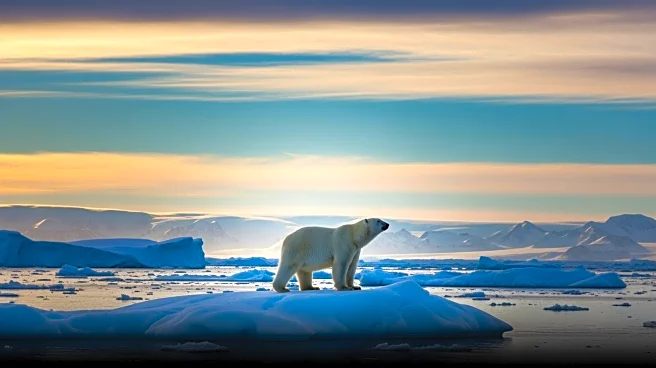What's Happening?
The Trump administration has proposed a $50 million foreign aid package aimed at protecting polar bears in Greenland. This initiative has raised questions among conservationists, particularly as U.S. polar bears face
significant threats from oil industry activities in Alaska. The proposal comes amidst ongoing industrial operations in Alaska's Arctic region, where companies are preparing to conduct seismic testing to locate oil reserves. This testing involves the use of heavy equipment that poses risks to polar bear habitats, potentially endangering cubs in their dens. The plan has drawn criticism for prioritizing international conservation efforts over domestic needs, especially given the declining population of polar bears in the Southern Beaufort Sea area.
Why It's Important?
The proposal highlights a critical debate over conservation priorities and resource allocation. While the protection of polar bears is a global concern, the focus on Greenland's bears over those in the U.S. raises questions about the administration's commitment to domestic environmental issues. The oil industry's expansion in Alaska could have severe ecological impacts, threatening local wildlife and ecosystems. This situation underscores the tension between economic development and environmental preservation, with potential long-term consequences for biodiversity and climate change mitigation efforts. Stakeholders, including environmental groups and local communities, may push for a reevaluation of conservation strategies to ensure that U.S. wildlife receives adequate protection.
What's Next?
The proposal is likely to prompt further discussions among policymakers, environmentalists, and the public regarding the balance between international aid and domestic conservation efforts. There may be calls for increased transparency and accountability in how conservation funds are allocated and utilized. Additionally, the oil industry's activities in Alaska could face heightened scrutiny, potentially leading to regulatory changes or legal challenges aimed at protecting vulnerable species. The outcome of these discussions could influence future U.S. environmental policies and international conservation collaborations.
Beyond the Headlines
This development raises broader ethical and cultural questions about the responsibility of nations to protect global biodiversity while addressing domestic environmental challenges. The prioritization of international conservation efforts over local needs may reflect geopolitical considerations, such as strengthening diplomatic ties or enhancing global leadership in environmental issues. However, it also highlights the need for a more integrated approach to conservation that considers both global and local ecological impacts. The situation may prompt a reevaluation of how conservation priorities are set and the role of public opinion in shaping environmental policy.









